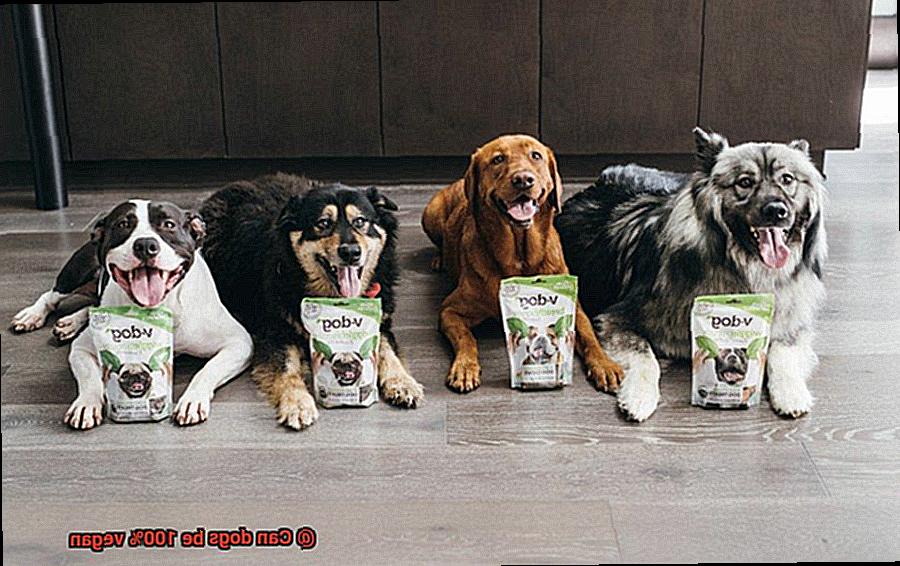Can dogs be 100% vegan?
The vegan movement has been spreading like wildfire, captivating more and more people who are embracing plant-based diets. And as this trend continues to gain momentum, a burning question arises: can our furry friends, dogs, truly thrive on a fully vegan diet? It’s a topic that sparks heated debates among pet owners, vets, and animal lovers.
For centuries, dogs have been labeled as carnivores due to their ancestors’ meat-rich diets. But with the advent of high-quality plant-based alternatives, some argue that dogs can live healthy lives without consuming any animal products. Sounds simple enough, right?
In this article, we’ll delve into the scientific realm and explore the potential benefits and challenges of a vegan diet for our canine companions. By examining their nutritional requirements, digestive systems, and ethical considerations, we’ll debunk misconceptions and shed light on this evolving subject. So buckle up and get ready to explore whether dogs can truly thrive on a 100% vegan diet.
The Nutritional Needs of Dogs: Protein, Amino Acids, Fatty Acids, Vitamins and Minerals
Contents
- 1 The Nutritional Needs of Dogs: Protein, Amino Acids, Fatty Acids, Vitamins and Minerals
- 2 Challenges of a Vegan Diet for Dogs
- 3 Potential Alternatives for Meeting Nutritional Needs
- 4 Considerations for Implementing a Vegan Diet
- 5 Ethical Reasons Behind Considering a Vegan Diet for Dogs
- 6 Sustainable Pet Food Companies that Prioritize Animal Welfare and Eco-friendly Practices
- 7 Pros and Cons of a 100% Vegan Diet for French Bulldogs
- 8 How to Transition Your French Bulldog to a Vegan Diet
- 9 Conclusion
In this blog post, we will explore the importance of protein, amino acids, fatty acids, vitamins, and minerals in your Frenchie’s diet. So grab a croissant and let’s dive in.
Protein: Building Strong Bodies:
Protein is the backbone of your Frenchie’s health. It supports muscle development, strengthens their immune system, and keeps their coat shiny and luscious. Opt for high-quality protein sources like lean meats (chicken, turkey), fish (salmon, tuna), and eggs. Remember, Frenchies are prone to allergies, so choose proteins that work well with their sensitive tummies.
Essential Amino Acids: The Superheroes of Nutrition:
Amino acids are the superheroes behind protein’s powers. Frenchies need 10 essential amino acids that can only be obtained through their diet. These mighty amino acids play a vital role in muscle repair, brain function, and overall vitality. Make sure your Frenchie’s diet includes arginine, lysine, and valine-rich foods such as lean meats and legumes.
Fatty Acids: The Secret to Healthy Skin and Coats:
Frenchies are known for their adorable wrinkles and velvety-soft coats. To keep them looking fabulous, include omega-3 and omega-6 fatty acids in their diet. These healthy fats promote skin hydration, reduce inflammation, and enhance brain function. Treat your Frenchie to some fish oil or flaxseed oil for a luxurious coat that will make heads turn at the dog park.
Vitamins and Minerals: The Cherry on Top:
Just like us humans, Frenchies need a balanced mix of vitamins and minerals to thrive. Vitamin A is essential for vision, while vitamin D aids in calcium absorption for strong bones. Vitamin E supports a healthy immune system, and vitamin C boosts collagen production for healthy skin. Don’t forget about minerals like calcium, phosphorus, and potassium that keep their bones strong and muscles functioning properly.
Vegan Diet for Frenchies: Mais Oui or Non?
While a vegan lifestyle may work for some humans, it’s crucial to understand that Frenchies are natural omnivores with specific nutritional needs. Providing a nutritionally balanced vegan diet for your Frenchie can be challenging due to the lack of natural plant-based sources for certain essential nutrients. It’s best to consult with a veterinarian or veterinary nutritionist before making any dietary changes.
Challenges of a Vegan Diet for Dogs
French Bulldogs are adorable little bundles of energy and love, but they also have unique dietary needs. While some people may choose to follow a vegan lifestyle themselves, it’s important to consider whether a vegan diet is suitable for our furry friends. Let’s dive into the challenges that arise when feeding French Bulldogs a vegan diet.
Meeting Nutritional Needs
French Bulldogs, like all dogs, require specific nutrients to thrive. These include protein, amino acids, essential fatty acids, vitamins, and minerals. A vegan diet can make it challenging to meet these needs since many of these nutrients are predominantly found in animal-based sources.
Plant-Based Protein Sources
Plant-based proteins such as soy, lentils, and peas can be used as alternatives to meat in a vegan dog diet. However, it’s crucial to ensure that these protein sources are complete and provide all the essential amino acids that French Bulldogs need. Additional supplements may also be necessary to ensure adequate protein intake.
Essential Fatty Acids
French Bulldogs require sufficient amounts of essential fatty acids, particularly omega-3 fatty acids, for optimal health. While some plant-based sources like flaxseeds and chia seeds contain omega-3 fatty acids, they are not efficiently converted by a dog’s body. Therefore, supplementation with algae-based omega-3 supplements may be necessary.
Vitamins and Minerals
Certain vitamins and minerals that are primarily found in animal products are essential for French Bulldogs’ overall health. Vitamin B12 is one example, as it is crucial for neurological function and the production of red blood cells. Vegan dog owners must ensure their furry friends receive enough vitamin B12 through fortified plant-based foods or supplements.
Calcium Considerations
Calcium is another critical nutrient that may be lacking in a strictly vegan diet for French Bulldogs. Dogs need calcium for healthy bone development and maintenance. While some plant-based sources like kale and broccoli contain calcium, it can be more challenging to provide sufficient amounts without relying on animal-based sources or supplements.
Digestive Challenges
French Bulldogs, like all dogs, have shorter digestive tracts compared to herbivores. This makes it more difficult for them to break down and absorb nutrients from plant-based foods. Gradual dietary changes and the incorporation of digestive enzymes can help ease the transition to a vegan diet.
Individual Differences
It’s important to note that not all French Bulldogs will thrive on a vegan diet. Some dogs may have specific dietary requirements or health conditions that necessitate a meat-based diet. Consulting with a veterinarian is crucial before making any significant changes to your Frenchie’s diet, including transitioning to a vegan one. Regular monitoring and blood tests can help ensure that your French Bulldog is receiving all the necessary nutrients on a vegan diet.
Potential Alternatives for Meeting Nutritional Needs
Feeding French Bulldogs a vegan diet can be a controversial topic, but with careful planning and consideration, it is possible to meet their nutritional needs. In this blog post, we will explore potential alternatives for providing a well-balanced vegan diet for your French Bulldog, ensuring they receive all the necessary nutrients for optimal health.
Carefully Formulated Vegan Dog Food:
One option is to choose a high-quality, commercially available vegan dog food that is specifically formulated to meet the nutritional needs of dogs. These foods are made from plant-based ingredients like legumes, grains, and vegetables, and are fortified with essential nutrients such as vitamins, minerals, and amino acids. Look for brands that have undergone rigorous testing and have a good track record of providing balanced nutrition.
Combination of Vegan and Animal-Based Foods:
Another alternative is to incorporate a combination of vegan and animal-based foods into your French Bulldog’s diet. This approach allows for a more balanced nutrient profile while still reducing the reliance on animal products. For example, you can include small amounts of high-quality animal protein sources like eggs or fish in their vegan meals to ensure an adequate intake of essential amino acids.
Supplements:
To ensure your French Bulldog receives all the necessary nutrients on a vegan diet, it may be beneficial to supplement their meals with certain nutrients that may be lacking. Consult with your veterinarian or a veterinary nutritionist to determine which supplements are necessary based on your dog’s specific needs. Common supplements for vegan dogs include omega-3 fatty acids (from algae-based sources), vitamin B12, and taurine.
Individual Considerations:
It is important to recognize that not all dogs may thrive on a vegan diet. Some French Bulldogs may have specific dietary requirements due to health conditions or breed-specific needs that may need to be addressed through alternative approaches. Consulting with a veterinarian or a veterinary nutritionist is crucial in determining the best course of action for your individual French Bulldog.
Considerations for Implementing a Vegan Diet
French Bulldogs, like all dogs, have specific nutritional requirements that must be met to maintain their health and well-being. While dogs are primarily carnivorous animals, it is possible to provide them with a vegan diet that meets their nutritional needs. However, it is important to ensure that the diet is balanced and complete, providing all the essential nutrients they require.
Protein Sources:
Protein is an essential nutrient for French Bulldogs, as it supports muscle growth and repair. While traditional dog diets rely on animal protein sources, vegan diets can provide protein through plant-based sources such as tofu, tempeh, lentils, and quinoa. It is important to choose high-quality protein sources that contain all the essential amino acids necessary for your French Bulldog’s optimal health.
Essential Nutrients:
In addition to protein, French Bulldogs also require other essential nutrients like omega-3 fatty acids, vitamin B12, vitamin D, calcium, and iron. These nutrients are predominantly found in animal products; therefore, it is crucial to ensure that they are adequately supplemented in a vegan diet. This can be achieved by incorporating plant-based sources of these nutrients or using appropriate supplements under the guidance of a veterinarian.
Allergies and Sensitivities:
French Bulldogs, like any other breed, can develop allergies or sensitivities to certain food ingredients. While a vegan diet may help alleviate some allergies related to meat or dairy products, it is important to be mindful of potential allergens in plant-based diets as well. Common allergens for French Bulldogs include soy, wheat, corn, and certain types of legumes. It is essential to carefully introduce new ingredients into their diet and monitor any adverse reactions.
Digestive System Adaptation:
French Bulldogs have unique digestive systems that require special attention when transitioning to a vegan diet. Their digestive tracts are shorter compared to herbivorous animals, which means they may have a harder time breaking down and extracting nutrients from plant-based foods. Gradually introducing vegan foods and monitoring their digestion and overall well-being is crucial to ensure a smooth transition.
Veterinary Guidance:
Implementing a vegan diet for French Bulldogs should always be done under the guidance of a veterinarian. They can assess your dog’s individual needs, monitor their health, and provide specific recommendations or adjustments to ensure the diet is nutritionally adequate. Regular check-ups and blood tests can help identify any deficiencies or imbalances that may arise from a vegan diet.
Ethical Reasons Behind Considering a Vegan Diet for Dogs
By exploring the ethical reasons behind a vegan diet for dogs, we can make informed decisions that align with our values and promote animal welfare and environmental sustainability.
The Nutritional Needs of Dogs:
Dogs naturally crave meat, but they can also derive nutrition from plant-based sources. It’s important to understand that dogs require essential nutrients like protein, amino acids, fatty acids, vitamins, and minerals. These nutrients are typically found in animal-based products, so it’s vital to ensure a vegan diet meets these needs through careful planning and supplementation.
Challenges of a Vegan Diet for Dogs:
While a vegan diet for dogs is possible, it can be challenging to provide a nutritionally balanced meal that meets all their requirements. Some essential nutrients are harder to obtain from plant-based sources alone. This is where consulting with a veterinarian or veterinary nutritionist becomes crucial to ensure your French Bulldog’s health and wellbeing.
Meeting Nutritional Needs with Plant-Based Alternatives:
To meet your French Bulldog’s nutritional needs on a vegan diet, you can incorporate various plant-based alternatives. Plant-based protein sources like soy, lentils, peas, and quinoa can provide the necessary amino acids. Additionally, including a variety of fruits, vegetables, and grains ensures a diverse nutrient profile.
Considerations for Implementing a Vegan Diet:
Transitioning your French Bulldog to a vegan diet should always be done under professional supervision. Working closely with your veterinarian helps monitor your dog’s health and make necessary adjustments. Regular check-ups will ensure your French Bulldog receives the proper nutrients they need to thrive.
Addressing Ethical Concerns:
By adopting a vegan diet for your French Bulldog, you can extend your commitment to animal welfare beyond your own lifestyle choices. Avoiding the support of factory farming practices, which often involve inhumane treatment and confinement, is a significant ethical consideration. Additionally, reducing your pet’s carbon pawprint contributes to a more sustainable planet.
Sustainable Pet Food Companies that Prioritize Animal Welfare and Eco-friendly Practices
As a responsible pet owner, you want the best for your furry friend, including their food. Sustainable pet food companies are a great choice for conscientious pet parents who prioritize animal welfare and eco-friendly practices. In this section, we’ll explore how these companies go above and beyond to ensure your French Bulldog receives the best nutrition while minimizing their environmental impact.
- Sustainably Sourced Ingredients: Sustainable pet food companies carefully select ingredients that are sustainably sourced and produced. This means that the ingredients used in their pet food are obtained in a way that minimizes harm to the environment and ensures the well-being of animals involved in the production process. This includes using plant-based protein sources like peas, lentils, and quinoa, which provide all the essential amino acids required by dogs.
- Organic and Non-GMO Options: These companies prioritize organic and non-GMO ingredients to avoid the use of synthetic pesticides and genetically modified organisms. By choosing pet food made with organic ingredients, you can be confident that your French Bulldog is enjoying a wholesome and natural meal.
- Minimizing Waste: Sustainable pet food companies are committed to minimizing waste by utilizing by-products from the human food industry. For example, they may incorporate meat trimmings or organs that would otherwise go to waste into their pet food formulas.
- Animal Welfare Partnerships: Animal welfare is a top priority for sustainable pet food companies. They often partner with animal welfare organizations or conduct their own research to ensure their practices align with the well-being of animals. Regular audits of suppliers and collaborations with veterinarians and nutritionists ensure that pets receive optimal nutrition while being treated ethically.
- Eco-friendly Packaging: Sustainable pet food companies understand the importance of eco-friendly packaging. They opt for recyclable or biodegradable materials and minimize excessive packaging whenever possible. By choosing their products, you can help reduce waste in landfills and promote a more sustainable approach to packaging.
Pros and Cons of a 100% Vegan Diet for French Bulldogs
While there are advantages to feeding your furry friend a plant-based diet, it’s essential to weigh the pros and cons before making the switch. In this blog post, we will explore the benefits and challenges of a 100% vegan diet for French Bulldogs.
Pros:
Reduced risk of certain health conditions:
- Obesity: A vegan diet can help maintain a healthy weight by providing lower calorie and fat options, reducing the risk of obesity-related health issues.
- Allergies: Some French Bulldogs may have allergies or sensitivities to animal-based ingredients. A vegan diet eliminates these allergens, leading to improved overall health.
- Digestive problems: Plant-based diets are often easier to digest, promoting better gastrointestinal health in French Bulldogs.
Environmental benefits:
- By choosing a vegan diet for your French Bulldog, you contribute to reducing greenhouse gas emissions, deforestation, and water pollution caused by animal agriculture.
- You play an active role in creating a more sustainable future for our planet.
Ethical reasons:
- Feeding your French Bulldog a vegan diet aligns with your personal values and opposes cruelty associated with factory farming and animal exploitation.
- It allows you to extend your ethical choices to your beloved pet.
Cons:
Nutritional concerns:
- Meeting the specific nutritional requirements of French Bulldogs on a vegan diet can be challenging. Essential nutrients like vitamin B12, taurine, and certain amino acids are primarily found in animal products.
- Without careful planning and supplementation, a vegan diet may result in nutrient deficiencies and potential health issues for your French Bulldog.
Digestive issues:
- Dogs have evolved as carnivores, and their digestive systems are naturally designed to process animal-based foods. A sudden transition to a vegan diet can lead to digestive upset, including diarrhea, gas, and bloating.
- Some French Bulldogs may struggle to digest plant-based proteins, leading to nutrient malabsorption and digestive discomfort.
Individual variability:
- Just like humans, dogs have unique nutritional needs and preferences. While some French Bulldogs may thrive on a vegan diet, others may have difficulty obtaining adequate nutrition or may refuse certain plant-based foods.
- It is crucial to consider your dog’s individual needs and consult with a veterinarian or veterinary nutritionist before transitioning them to a 100% vegan diet.
How to Transition Your French Bulldog to a Vegan Diet
It’s crucial to consult with a veterinarian or veterinary nutritionist before making any major dietary changes for your dog. Here’s a comprehensive guide to help you navigate the transition process.
Gradual Transition:
Start by gradually introducing plant-based foods into your dog’s diet while still providing their regular animal-based food. Begin by adding small amounts of cooked vegetables, fruits, and grains to their regular meals.
Monitor your dog’s reaction to the new foods and make note of any digestive issues or allergies. Over time, increase the amount of plant-based foods while decreasing the amount of animal-based food.
Remember, patience is key as it may take several weeks or even months for your French Bulldog to fully transition to a vegan diet.
Choosing High-Quality Vegan Dog Food:

To ensure a well-rounded vegan diet for your French Bulldog, it’s important to choose high-quality, nutritionally balanced vegan dog food options. Look for products that are specifically formulated to meet the nutritional needs of dogs and have undergone rigorous testing. Check the ingredient list for sources of plant-based protein such as lentils, chickpeas, and quinoa.
Additionally, consider supplementing their diet with essential nutrients like vitamin B12, omega-3 fatty acids, and taurine, which are commonly found in animal-based products.
Making the Transition Easier:
Transitioning your French Bulldog to a vegan diet can be made easier by mixing vegan and regular dog food initially or adding tasty toppings to entice them to try new food. Experiment with different flavors and textures to find what your dog enjoys.
Remember that each dog is unique, so it may take some trial and error to find the right combination that they love.
Monitoring your Dog’s Health:
Throughout the transition process, it’s crucial to monitor your dog’s overall health and well-being. Regularly check their weight, coat condition, energy levels, and digestion.
If you notice any signs of allergies or digestive issues, consult with your veterinarian immediately. They can help you identify any nutrient deficiencies or adjust the diet as needed.
Conclusion
In conclusion, it is possible for dogs to be 100% vegan.
While they are naturally omnivores, with the right balance of plant-based proteins and nutrients, dogs can thrive on a vegan diet. However, it is crucial to consult with a veterinarian or a canine nutritionist to ensure that their dietary needs are met.
Additionally, monitoring their overall well-being and making adjustments as needed is vital.




